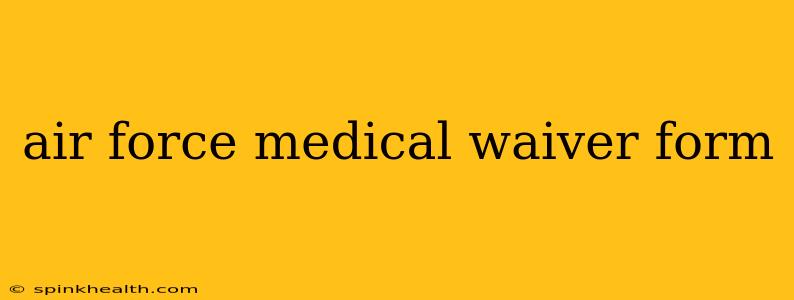The journey to becoming an Airman isn't always a straight path. For many aspiring recruits, medical conditions can present a hurdle. But don't despair! The Air Force understands that individuals may have pre-existing conditions that don't necessarily disqualify them from serving. This is where the Air Force medical waiver process comes in. This guide will walk you through the intricacies of this process, answering common questions and providing valuable insights to help you navigate it successfully.
What is an Air Force Medical Waiver?
Imagine you're passionate about flying, dreaming of soaring through the skies in a fighter jet. But a childhood asthma diagnosis seems to stand in your way. This is where a medical waiver becomes crucial. A medical waiver is a formal document issued by the Air Force that allows individuals with certain medical conditions to enlist or commission despite those conditions typically being disqualifying. It essentially says, "Yes, we know about this condition, but we believe you still meet the standards for service." This isn't a guarantee, though; the Air Force carefully considers each case individually.
What Medical Conditions Might Require a Waiver?
The Air Force has specific medical standards for enlistment and commissioning. These standards cover a wide range of conditions, including but not limited to:
- Vision: Corrective lenses, laser eye surgery history, and certain eye conditions.
- Hearing: Hearing loss, tinnitus, and previous ear surgeries.
- Asthma: History of asthma, allergies, and respiratory issues.
- Mental Health: History of depression, anxiety, or other mental health conditions.
- Musculoskeletal: Past injuries, surgeries, or conditions affecting bones, joints, or muscles.
This list is not exhaustive, and many other conditions might require a waiver. The key is to be completely honest and transparent during the medical screening process.
How Do I Apply for an Air Force Medical Waiver?
The application process starts with honesty and transparency. During your initial medical screening, disclose all your medical history, even seemingly minor conditions. Withholding information could jeopardize your chances of receiving a waiver. Your recruiter will guide you through the necessary paperwork and documentation. This often includes:
- Medical Records: Comprehensive medical records from your doctors, detailing diagnoses, treatments, and outcomes.
- Supporting Documentation: Letters of support from medical professionals may strengthen your application.
- AF Form 422: This is the official application form.
What Factors Influence the Decision to Grant a Waiver?
The Air Force's decision to grant a waiver isn't arbitrary. Several factors influence the outcome:
- Severity of the Condition: A mild condition is more likely to receive a waiver than a severe or chronic one.
- Stability of the Condition: If your condition is well-managed and stable, your chances improve.
- Impact on Military Duties: The Air Force will assess whether your condition would affect your ability to perform your duties effectively.
- Available Treatment: The availability of effective treatment or management options can also influence the decision.
What Happens After I Submit My Waiver Request?
After submitting your application, there's a waiting period while the Air Force reviews your medical records and supporting documentation. This process can take several weeks or even months. Patience is key. You'll be kept informed of the progress, and your recruiter will be your main point of contact.
Can I Appeal a Denied Waiver?
If your waiver request is denied, you have the option to appeal the decision. This process typically involves providing additional medical documentation or evidence to support your case. It’s important to carefully review the reasons for the denial and address them in your appeal.
Is there a specific Air Force Medical Waiver form?
There isn't one single "Air Force Medical Waiver Form." The process involves multiple forms and documentation, guided primarily by your recruiter. They will provide the necessary forms and assist you in compiling the required information.
What is the success rate of Air Force medical waivers?
The success rate of Air Force medical waivers varies greatly depending on the specific condition, its severity, and the supporting documentation. There's no publicly available statistic for overall success rates.
How long does the Air Force medical waiver process take?
The processing time for a medical waiver can range from several weeks to several months, depending on the complexity of the case and the availability of medical records.
The Air Force medical waiver process is complex, but with thorough preparation and a proactive approach, you can significantly increase your chances of success. Remember, open communication with your recruiter is crucial throughout the entire process. With persistence and the right guidance, you can turn your dream of serving in the Air Force into a reality.

